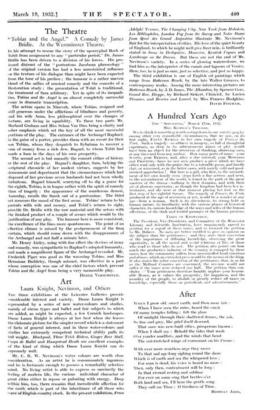The Theatre • • •
"Tobias. and the Anger A Comedy by James Bridie: At the Westminster Theatre.
Ix. his attempt to rescue the story of the apocryphal Book of Tobitfrom assignment to any " particular period," Dr. James Bridle has been driven to a division of his forces. His pro- fessed distrust of the " portentous Jacobean phraseology " of the original .version has had a less unrestricted influence on the texture of his dialogue than might have been expected from the tone of his preface ; the humour is a rather uneven blend of the sallies of musical comedy and the conceits of a -Restoration study ; the presentation of Tobit is traditional, the treatment of Sara arbitrary. Yet in spite of its inequali- ties, Tobias and the Angel is an almost completely successful essay in dramatic transcription.
The action opens in Nineveh, where Tobias, resigned and still generous under the afflictions of blindness and poverty, and his wife Anna, less philosophical over the changes of fortune, are living in squalidity. To these two parts Mr. Morland Graham and Miss Selma Vaz Dias bring a clarity and sober emphasis which set the key of all the most successful portions of the play. The entrance of the Archangel Raphael, in the guise of a porter, provides them with an escort for their son Tobias, whom they despatch to Ecbatana to recover it sum of money from a rich Jew, Baguet, to whom Tobit had made a loan in the days of his own prosperity.
The second act is but uneasily the consort either of history or the rest of the play. Raguel's daughter, Sara, belying the scriptural chronicle of her modest virtues, suggests by her demeanotir and deportment that the circumstances which had disposed of her previous seven husbands had not been wholly fortuitous.'; Baguet himself, scurrying off to dig a grave for the eighth; Tobias, is in league rather with the spirit of comedy than of tragedy : the appearance of the murderous demon, Asmoday, recalls the Snack out of a pantomime. The third act recovers the mood of the first scene. Tobias' return to his parents with wife and money, and Tobit's return to sight, provide Dr:Bridle with the raw material and the actors with the finished product of a couple of scenes which would be the ustification of any play. The humour here is more consistent, he excellence of the lines more spontaneous. The point of an effective climax is missed by the postponement of the final curtain, which should come down with the disappearance of the Archangel and not half a minute later.
Mr. Henry Ainley, using with fine effect the devices of irony and comedy, was sympathetic to Raphael's adopted humanity, and made a magnificent figure of the Archangel revealed. Mr, Frederick Piper was good as the wavering Tobias, and Miss Hermione Baddeley, though miscast, was effective in a part whose conception was one of the chief factors which prevent Tobias and the Angel from being a very memorable play.
DEREK VERSCIIOYLE.






































 Previous page
Previous page